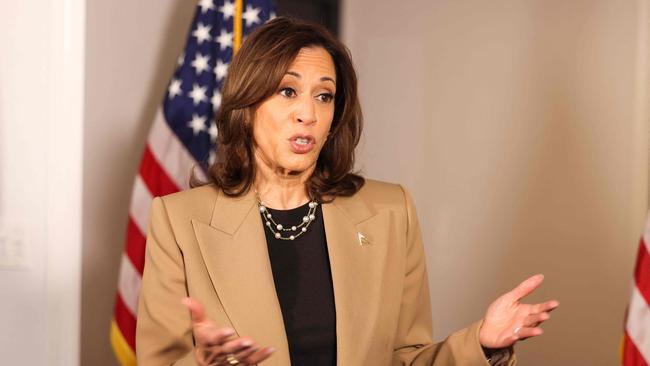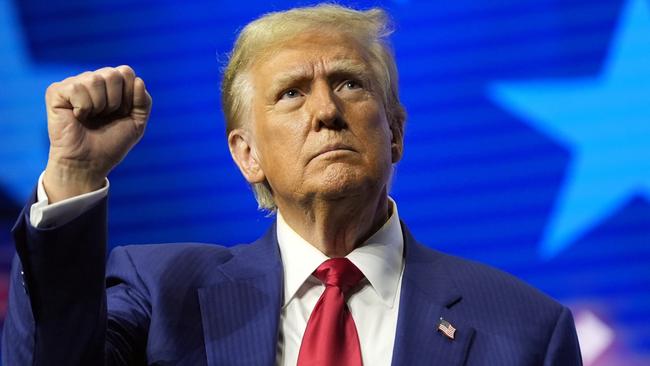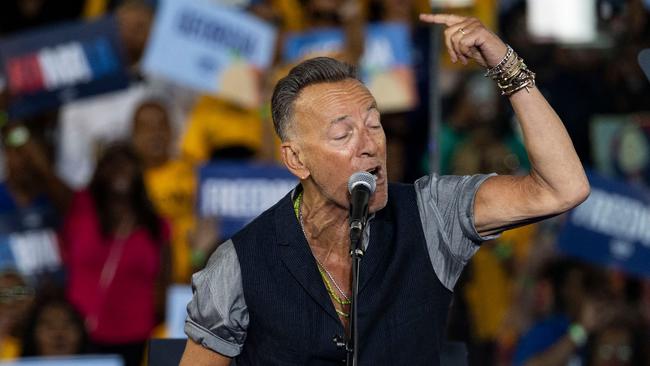
A day later the party’s presidential candidate Kamala Harris compared her opponent Donald Trump to Adolf Hitler, after an old claim from Trump’s former chief of staff John Kelly re-emerged: the former president had expressed a fondness for the German leader’s generals, years ago as president.
“He wanted generals like Adolf Hitler had; Trump said that because he doesn’t want a military that is loyal to the United States constitution,” Harris said, speaking to reporters at her official residence in Washington, hours before telling CNN she believed Trump was “fascist”.
“Godwin’s Law”, the amusing idea that debates left to simmer long enough eventually result in comparisons to Hitler and fascism, has been satisfied many times over during this presidential cycle.
The same allegations against Trump, published in The Atlantic, a magazine owned by a close friend of Harris and major Democrat donor Laurene Powell Jobs, appeared in The Washington Post in August 2022.
Trump can’t complain about incendiary language given he uses it himself, but the Democrats’ sudden shift to hysterical comparisons in the final two weeks suggests the Harris campaign has started to panic.
“Joy” is out, “hate”, a much better political motivator to be sure, appears to be in, and there are grounds for it, despite no sudden moves in the mainstream polls for or against either candidate.
The Vice-President spent almost the entire first 10 minutes of her town hall with CNN’s Anderson Cooper on Wednesday (Thursday AEDT) deriding Trump, bringing him up in response to almost every question from the audience in an event that even CNN moderators later said didn’t go well for Harris.
“When she doesn’t want to answer a question her habit is to go to word salad city,” said veteran Democrat strategist David Axelrod in the wake of the 90-minute town hall, pointing to a “seven minute answer (where) none of it related to the question (about Israel)”.
“If she was an animal, she would be a duck bill platitude,” joked his Republican co-panellist, Scott Jennings, not unfairly for anyone who has watched many of Harris’s impromptu performances.
That even friendly commentators have started to cast doubt on Harris’s ability with less than two weeks to go isn’t the only cause for Democrat concern. The steady if slight erosion in Harris’s national polling advantage – down from three percentage points after her convention speech in August to 1.3 percentage points, according to Nate Silver – has come as Harris has dramatically ramped up her media appearances.
Trump, by contrast, has not noticeably changed the number or type of his media appearances in the final fortnight, including refusing a second debate with Harris and declining to participate in his own CNN town hall. That’s the opposite of how an anxious campaign would behave, at least according to conventional political wisdom.

“My gut says Donald Trump. And my guess is that it is true for many anxious Democrats,” Silver wrote in The New York Times this week, revealing for the first time whom he thought would win.
At the same time, over the past four weeks all eight political betting markets tracked by RealClear Politics have swung noticeably Trump’s way, giving him a roughly 60 per cent chance of winning to Harris’s 38 per cent at the time of writing,
That’s not the only real-time indicator: Trump’s near revenue-less media company, Trump Media and Technology Group, which would only have serious value in the event Trump were re-elected, has surged from $US12 ($18) a share a month ago to almost $US36.
Early voting statistics, which show greater levels of Republican enthusiasm than expected, might be another cause for Democrats’ concern. More than 18 million Americans have already voted, including in all seven swing states; election day in the US has become election season.
For instance, in Florida’s Miami-Dade county, one of the nation’s most populous, more registered Republicans had voted early than registered Democrats after four days of voting, a stark reversal of the early relativities observed there in the 2020 presidential election.
Republicans are also leading the early vote count in North Carolina, Arizona and Nevada, while Democrats are ahead in Pennsylvania – the most critical swing state of all.
Georgia, Michigan and Wisconsin, the remaining swing states, do not report early votes by party affiliation, a reminder of how decentralised US election rules are. Arizona’s biggest county, Maricopa, said this week it would take 13 days to count the votes in the 4.5 million-strong jurisdiction, far longer than it takes France to tally its presidential elections.
It’s important not to make too much of early voting figures: they don’t account for changes in preferences over how to vote. The last 2020 election occurred during a pandemic, when Democrats were much more likely to vote by mail. And the type of registration doesn’t necessarily imply a vote for Trump or Harris.
On the other side of the ledger, the Harris campaign has a massive funding advantage over Trump in the final days of the campaign, ending the month of September with almost $US188m on hand compared to $120m for Trump.
In September, Harris’s campaign outraised Trump’s by more than three to one, according to the latest federal filings.
Megastar Taylor Swift’s endorsement of Harris in August didn’t appear to fuel much Democrat momentum, but the Harris campaign has since tapped more big stars to campaign for her. All-American music icon Bruce Springsteen joined Harris and Obama on stage at a rally in Atlanta on Friday, hot on the heels of legendary rapper Eminem, who appeared with them in Detroit.

And it’s possible the “Trump as Hitler” political gambit will sway some of that vanishingly small, but critical, group of genuinely undecided voters in the final two weeks of the campaign. But if the Atlantic piece was the “October surprise”, then Democrats should be disappointed.
It’s highly likely a deluge of negative stories about Trump will emerge in the final 12 days of the campaign. Earlier this week, The Guardian ran a story that in 1993 Trump groped Stacey Williams, a 56-year-old former model, while Jeffrey Epstein watched.
As an October surprise, it’s probably fallen short of what Democrats might need to win, given Trump still won in 2016 after the infamous “access Hollywood” tapes emerged.
Former Democrat turned Trump supporter Robert F. Kennedy told Americans a vote for Harris was a “vote for nuclear war” in a video message released on Thursday (Friday AEDT).
Expect the final few days of the campaign to offer up a few surprises and a lot of vitriol, especially if polls move further in Trump’s direction.
Republican strategist Kellyanne Conway is predicting what she calls a “narrow landslide”, where Trump narrowly wins most of the swing states and thereby an overwhelming majority of the electoral college.
If that’s what occurs, Harris’s campaign, and indeed her late-in-the-day candidacy, will be dubbed a disaster, given winners write history. Likewise will Trump’s, if he loses. Potentially a few thousand Americans on the morning of November 5 will determine which verdict emerges.





“I don’t understand how we got so toxic and so divided, so bitter,” wondered former president Barack Obama on Tuesday (Wednesday AEDT) at a campaign rally with Democrat vice-presidential candidate Tim Walz.